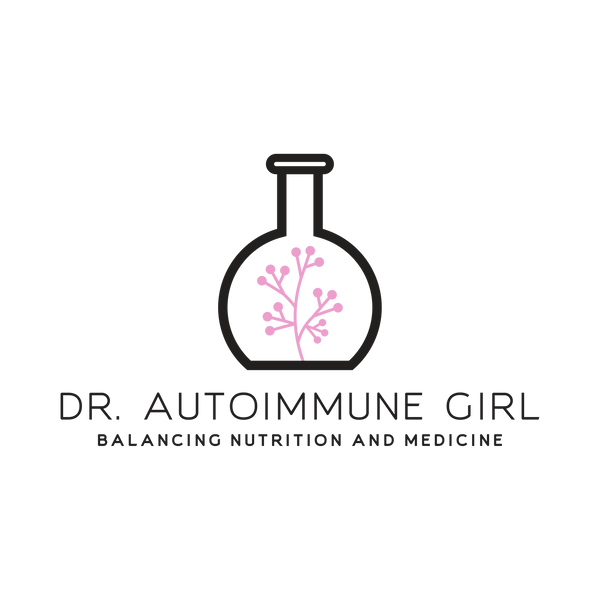It’s completely normal to feel absolutely lost and confused when getting diagnosed with an autoimmune disease, leaving you feeling helpless.
- Why did this happen?
- What does it mean?
- How can I gain control?

Ultimately the goal with any autoimmune condition we want to focus on key factors that impact inflammation and gut health
- Reduce Inflammation
- Optimize nutrition
- Focus on your gut
- Manage stress and sleep
Reduce Inflammation
Let’s start by talking about inflammation. We focus so much on how inflammation is a BAD thing, but we forget about what the true process of an inflammatory response is and what that means? When you cut yourself or have an infection your immune system gets activated to protect you, which is known as acute inflammation. Typically symptoms we see are fever, redness, and swelling. While it may not be the most pleasant feeling it’s an acute response to help you heal. When we refer to inflammation being a bad thing, we are referring to chronic inflammation. This is a response that doesn’t go away and is constantly lingering in the body associated with arthritis, cancer, diabetes, and you guessed it, autoimmune disease.
Typical symptoms associated with chronic inflammation include body pain, constant fatigue, gut disorders, and frequent infections.
So now that we understand the basis of chronic inflammation how do we control it?
All of our pillars are associated with reducing inflammation, diet, stress, sleep, gut health, and nutrients.
Let’s start by removing inflammatory foods:
- Simple sugars and refined and processed white flour – Foods that promote bacterial overgrowth and lead to leaky gut
- Processed sugar – Cause immunosuppression for 2-4 hours after eating
- Saturated fats – High in inflammatory omega 6 fatty acid
- Food allergens – Can form immune complexes and lead to inflammation
- Gluten – The biggest perpetuate of leaky gut. Gliadin is the toxic, immunogenic component of gluten and is mediated by T cell activation. When gliadin interacts with the intestinal epithelium it increases leaky gut.
- Dairy – The 3 proteins in dairy: lactose, casein and whey can all cause inflammation in different individuals
Optimize Nutrition
Instead of focusing on specific fruits or vegetables, make a goal to consume 9 servings of plant based foods daily. Make it a VARIETY of colors, eat the rainbow and this will ensure you are getting adequate nutrients that work in synergy.

Phytonutrients are substances found in plants each with a role in preventative health and have protective anti-inflammatory effects. Fiber is a key component to plant based foods, pulling toxins from the gut and acting like a broom to sweep them out. I talk about so many details around how foods impact the immune system in my book The Immunity Food Fix.
That is one aspect to focus on when we are looking at autoimmune disorders, and really any health issues. The overall goal is keeping levels of inflammation down and avoiding foods that cause inflammation, or are pro-inflammatory.
Since more than 70% of our immune system cells are found along the lining of our digestive tract, your immune response is hugely affected by the foods that interact with your gut. This takes us into talking about gut health in autoimmunity.
Focus on Gut Health
The bacteria in your gut effect more than just your belly – when you have a balance your immune system is strong, you have good digestion, your skin glows, and your mood is improved! The standard American diet doesn’t feed the good bacteria and help them grow! Plus sugar triggers inflammation, further disrupting the balance of good and bad. Unfortunately, with our pro-inflammatory lifestyle and excessive exposure to antibiotics our microbiome has been altered, and in many ways permanently. This is why I formulated my Step 1: Nourish Probiotic and Step 2: Flourish Probiotic to heal and support the immune system. Taking Step 1 is critical to kill off any yeast production and overgrowth of other bacteria before implementing Flourish Probiotic Step 2 consistently. Not all supplements are created equal and fortunately Besana is formulated with certified good manufacturing practices ensuring quality ingredients. While most of what we have highlighted focus on our gut and diet, other lifestyle measures such as lack of sleep and stress can have negative implication on our immune system.

Manage Stress and Sleep
Stress has been shown to be associated with disease onset, and disease exacerbations in autoimmune conditions. Psychological therapy and cognitive behavioral therapy aimed to reduce stress levels was shown to be effective in influencing better outcomes in many autoimmune diseases.
Sleep has an important role to play in the human immune system and it is critical in the restoration and maintenance of homeostasis. Sleep deprivation and disorders may have a profound impact on health, well being and the ability to resist infection. Sleep disorders may trigger immune system abnormalities inducing autoantibody production, possibly leading to the development of autoimmune disease.
Recognizing how we can prevent disease or for many reduce unexplained symptoms starts Recognizing how we can prevent disease or for many reduce unexplained symptoms starts with our lifestyle. Our gut health is at the center at it all with 70% of our immune system in our gut, and when I get asked where do I start, I typically point to the gut. Starting with an elimination diet, similar to my gut protocol, optimizing the bacteria in your gut with a quality probiotic and focusing on eating more plant-based foods.
